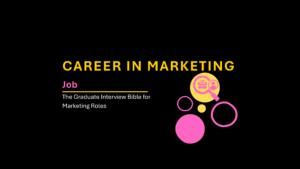Why Application Strategy Matters in 2025
If writing a CV is your marketing campaign, then sending out job applications is your sales funnel. In 2025, the UK job market isn’t about who clicks Apply the most times. It’s about who applies smart.
A shocking stat from Milkround (2025):
- The average graduate applies to 30+ jobs before landing an interview.
- But only 20% of applicants tailor their CV and cover letter to each job.
- Those who tailor? They are 3x more likely to get an interview.
💡 Here’s the truth: spraying out 100 generic applications = wasted energy. Sending 10 laser-targeted ones = results.
As HBR’s Guide to Job Search explains:
“Treat applications like pitches. Each one should speak directly to the employer’s needs, not just your desire to work there.”
Where to Apply: Milkround, Indeed & Beyond
You don’t need 20 job boards open. You need to master 3–4 and build a system.
- Milkround (Graduate Schemes)
- The go-to for structured graduate schemes (big agencies, FMCGs, banks).
- Deadlines: Sept–Nov mostly, with some late openings until Jan.
- Good for international students because schemes often come with sponsorship.
👉 Best Strategy: Set alerts in August so you’re ready the minute schemes open.
- Indeed (Graduate Jobs & Internships)
- Covers SMEs, startups, and rolling jobs.
- Jobs update daily. Many “apply direct” via company websites.
- Great for finding hidden marketing roles outside the big schemes.
👉 Best Strategy: Use Boolean searches like:
(“Marketing Assistant” OR “Digital Marketing Graduate”) AND (Visa OR Sponsorship)
💡 Indeed hack: Filter by “last 24 hours” so you’re one of the first 10 applicants (recruiters love fresh CVs).
- CV-Library / TargetJobs / LinkedIn
- CV-Library = huge database + recruiter outreach.
- TargetJobs = employer-led profiles, deadlines, assessment advice.
- LinkedIn = hidden jobs + networking.
As HBR’s 10 Must Reads on High Performance stresses:
“Your network is as important as your application. Internal referrals increase hiring chances by 40%.”
So don’t just apply. Message alumni, recruiters, and managers.
The 3 Golden Rules of Applications
Rule 1 – Speed Beats Perfection
- Jobs on Indeed often close within 7 days.
- Be “early good” not “late perfect.”
Rule 2 – Tailoring is Non-Negotiable
- Copy job ad keywords into your CV.
- Mention the company name in your cover letter.
- Align your examples with their required skills.
Rule 3 – Follow Up (Professionally)
- Send a polite LinkedIn message after applying.
- Example:
“Hi [Recruiter], I’ve just applied for the Marketing Graduate role at [Company]. Excited by the focus on [specific skill]. Would love the chance to contribute. Best, [Your Name].”
Data: What Actually Works
From Indeed’s UK Job Trends (2025):
- Applications submitted between 8–10am are 35% more likely to be reviewed.
- CVs with 3–4 tailored bullet points matching the job ad increase interview chances by 70%.
- Following up increases callback likelihood by 22%.
From Milkround (2025 survey):
- 41% of grads regret sending rushed applications.
- 32% admitted they applied without reading the full job description.
- 67% of employers say “lack of tailored applications” is their #1 frustration.
Recruiter Quotes
From Christine Reidhead, Get That Job!:
“If your cover letter could apply to 10 different companies, it’s useless. Employers want to feel you wrote it just for them.”
From TechTalk Cover Letter Template:
“Keep it to one page. Say who you are, why this role, why them, and what you bring. Nothing more.”
From HBR Job Search Guide:
“Think of rejection not as failure, but as redirection. Each tailored application builds skills that compound.”
Glossary of Application Strategy Terms
Term | What It Means | Why It Matters |
Graduate Scheme | Structured programme with training and higher pay. | Often includes visa sponsorship. |
Rolling Application | Jobs with no set deadline; filled when the right candidate appears. | Apply early to beat competition. |
Boolean Search | Using AND/OR/quotes in job searches. | Helps filter only relevant jobs. |
Tailoring | Editing CV/cover letter for each role. | Increases interview chances by 3x. |
Follow Up | Reaching out post-application. | Shows initiative + increases callbacks. |
International Student Focus
As an international student, your application strategy has extra weight. The UK Home Office requires a £38,900 salary threshold for Skilled Worker visas.
That means:
- Prioritise graduate schemes (£35–42k average).
- Target SEO/PPC Analyst roles (£28–35k now, quick progression).
- Avoid roles unlikely to sponsor (Social Media Exec at £25k).
Pro tip: Use Migreats.com, Home Office Sponsor List or TheUKjobinstitute to filter companies already sponsoring visas.
Checklist: Is Your Application Strategy Strong?
- I set alerts on Milkround/Indeed for my keywords.
- I tailor my CV and cover letter to every role.
- I apply early (within 48 hours of posting).
- I follow up via LinkedIn/email.
- I prioritise roles above the visa salary threshold.
Conclusion
Applying in 2025 isn’t about sending more CVs. It’s about sending the right CVs, at the right time, to the right jobs.
Don’t get lost in the noise. Build a system, tailor your approach, and remember: every application is a pitch.
Download OTINGA’s Application Strategy Tracker Template — a simple tool to log deadlines, follow-ups, and sponsorship chances.
References
- Harvard Business Review (2024). HBR Guide to Your Job Search. Harvard Business Press.
- Milkround (2025). Graduate Survey and Employer Data.
- Indeed (2025). UK Job Application Trends.
- TechTalk UK (2024). CV & Cover Letter Templates.




